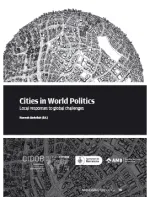Cities in World Politics. Local Responses to Global Challenges

Monografías CIDOB nº. 75
Urbanisation is one of the most powerful trends of the modern era. Since 2007, for the first time in history over half the world’s population lives in cities, a proportion the United Nations estimates will rise to two-thirds by 2050. Much of this urban growth will take place in Africa and Asia, but other regions will also be deeply affected.
The realisation that our future will be predominantly urban has bestowed unprecedented relevance on cities and urban regions in world politics. Over the past two decades there has been a progressive urban turn in global development policy, which acknowledges that today’s major challenges – from climate change to inequality – are concentrated in cities and that urban governance is essential to remedying them. The culmination of this policy trend is the UN 2030 Agenda for Sustainable Development, which includes a dedicated goal on inclusive, resilient and sustainable cities and 169 targets that nearly all depend on the actions of local governments.
We are witnessing profound transformations in global governance, in which cities are transitioning from being seen as local problem hotspots or strategic sites for intervention, towards being active drivers of positive change. This book seeks to contribute to an emerging debate on how cities are evolving into global political actors engaged in taking on responsibilities that were previously the preserve of nation-states, especially in the areas of climate change, migration and sustainable urban development.
ISBN: 978-84-92511-73-0
Key Words: urbanisation; climate change; global mobility; cities; 2030 Agenda for Sustainable Development